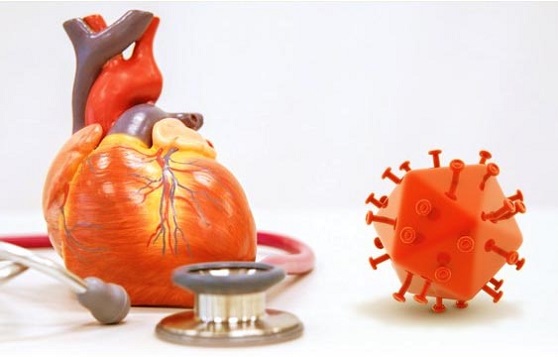Nikhil Prasad Fact checked by:Thailand Medical News Team Jul 25, 2024 1 year, 6 months, 3 weeks, 1 day, 15 hours ago
HIV News: HIV has transformed from a death sentence to a manageable chronic condition thanks to highly active antiretroviral therapy (HAART). However, this transformation has brought to light new challenges, including HIV-associated cardiomyopathy (HIVAC). This
HIV News report delves into recent research uncovering the intricate relationship between autophagy and HIVAC, shedding light on potential therapeutic targets to improve the heart health of HIV patients.
 New insights into how HIV disrupts autophagy and impacts heart health
Autophagy and HIVAC
New insights into how HIV disrupts autophagy and impacts heart health
Autophagy and HIVAC
Autophagy, a vital cellular process that recycles damaged components, is crucial for maintaining heart health. When autophagy is disrupted, it can lead to serious heart conditions. Researchers have discovered that HIV can interfere with autophagy, contributing to the development of HIVAC. This condition remains a significant cause of morbidity and mortality among HIV patients, even those with well-controlled viral loads and CD4 counts.
Key Study Findings
The Role of HIV Proteins
HIV proteins, such as negative regulatory factor (Nef), glycoprotein 120 (gp120), and transactivator (Tat), play a significant role in disrupting autophagy. These proteins interact with essential molecules like LC3-II, Rubiquitin, SQSTM1/p62, Rab7, ATG7, and LAMP1, all crucial for normal autophagy. Their interaction leads to the accumulation of dysfunctional cellular components, contributing to heart disease.
-Nef Protein: Nef interferes with autophagy by increasing the levels of LC3-II and interacting with Beclin-1. This interaction prevents the maturation of autophagosomes, leading to the accumulation of toxic proteins in heart cells.
gp120 Protein: This protein enhances autophagy by upregulating ATG7, Beclin 1, LAMP1, and LC3-II. However, this hyperactivation is detrimental as it overwhelms the cells, causing damage.
-Tat Protein: Tat reduces the levels of LC3-II and p62, crucial for autophagosome formation, leading to the accumulation of damaged proteins and organelles.
Impact of HAART
While HAART has extended the lifespan of HIV patients, it has also introduced new complications. Drugs like azidothymidine (AZT) and abacavir have been linked to heart dysfunction by disrupting autophagy. AZT, for instance, inhibits the late stages of autophagy, leading to the build-up of dysfunctional mitochondria, which produce excessive reactive oxygen species (ROS), causing oxidative stress and further damaging heart cells.
Potential Treatments
Researchers are exploring ways to mitigate the adverse effects of HIV and HAART on the heart by targeting autophagy pathways. One promising approach involves using the mTOR inhibitor rapamycin. This drug has shown potential in restoring autophagy and improving heart function by:
-Normalizing Autophagy Flux:
Rapamycin helps clear out accumulated dysfunctional mitochondria, reducing oxidative stress and improving cellular health.
-Improving Mitochondrial Function: By promoting the removal of damaged mitochondria, rapamycin enhances ATP production, crucial for heart cell function.
Future Directions
The ongoing research offers hope for developing new treatments targeting the underlying mechanisms of HIVAC. Future studies aim to:
-Refine Drug Therapies: Tailoring drugs to more specifically target autophagy pathways in heart cells without compromising immune function.
-Explore Genetic Factors: Understanding individual genetic variations that affect autophagy and heart disease progression in HIV patients.
Conclusion
HIV-associated cardiomyopathy remains a critical issue even in the era of effective antiretroviral therapy. The intricate interplay between HIV proteins and autophagy highlights new avenues for therapeutic interventions. By focusing on restoring normal autophagy functions, researchers aim to reduce the burden of heart disease in HIV patients, ultimately improving their quality of life.
The study findings were published in the peer-reviewed journal: Frontiers in Cell and Developmental Biology.
https://www.frontiersin.org/journals/cell-and-developmental-biology/articles/10.3389/fcell.2024.1372573/full
For the latest
HIV News, keep on logging to Thailand Medical News.
Read Also:
https://www.thailandmedical.news/news/hiv-news-flagellin-a-potential-game-changer-in-hiv-treatment
https://www.thailandmedical.news/news/hiv-increases-heart-disease-risk
